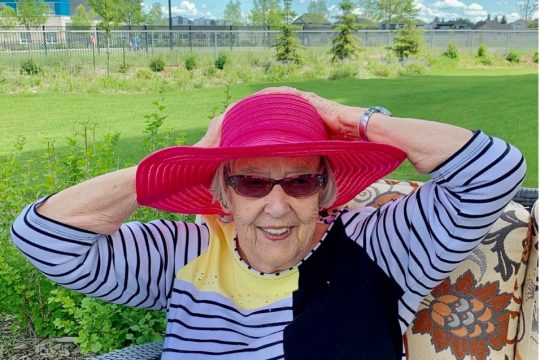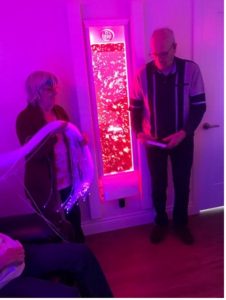
Gardening season is officially upon us!
It’s a flurry of activity as seniors at MacTaggart Place Retirement Residence get ready to garden.
“Engagement goes up when we say we will be gardening”, says Stephanie Roth, the Health & Wellness Director at the West Edmonton senior residence. “They get excited and talk about it during the time leading up to the program!”
“Gardening contributes to an active lifestyle, which for seniors, especially those with dementia, has many positive benefits”, she tells us.
Activities – The Cornerstone to Successful Days
For people living with dementia’s symptoms, withdrawal is common.
You might notice an apparent apathy begin to set in: loss of motivation, diminished initiation, low social engagement, poor persistence, lack of interest, and/or insight. The cause of this withdrawal can be complex; however, engaging in meaningful activities – like gardening – can counteract that withdrawal.
“It touches on so many aspects of a person’s life”, explains Roth, “that the benefits are multifaceted”.
‘There is a social aspect involving visiting and reminiscing with co-residents and staff; a sensory aspect when you are digging your hands in the dirt that can actually relieve pain, or smelling the beautiful scent from the flowers, which can bring back wonderful memories; and, a cognitive aspect, where attention levels are increased, and stress is decreased. Residents functioning at any level can enjoy a simple gardening program, and it often results in smiles and decreased agitation.”
1. Choose Physical Activity
“More blood to the brain is a good thing”, says Dr. Frank-D. Knoefel, a physician at the Bruyère Memory Program.
Physical activity seems to help your brain not only by keeping the blood flowing but also by increasing chemicals that protect the brain. Physical activity tends to counter some of the natural reduction in brain connections that occurs with aging.
In terms of importance, physical activity cannot be stressed enough. It might be the single best thing that you can do to fight cognitive decline. Interestingly, a major study added to the growing evidence that stimulating one’s mind by dancing can ward off Alzheimer’s disease and other dementia, much as physical exercise can keep the body fit. Dancing also increases cognitive acuity at all ages.
Dr. Knoefel agrees. “An activity like dancing that incorporates physical exercise, cognition (what is the next step, where can we move to), and socialization, gives the most “bang for your buck.”
2. The importance of Cognitive Stimulation
 Cognitive health – how well you think, learn, and remember – is an important component of everyday life. For people living with dementia and Alzheimer’s, lack of stimulation and boredom can be extremely frustrating. Keeping people with dementia actively engaged in everyday activities and cognitively challenging tasks is beneficial for both body and mind and, in some cases, can even slow the progression of the disease.
Cognitive health – how well you think, learn, and remember – is an important component of everyday life. For people living with dementia and Alzheimer’s, lack of stimulation and boredom can be extremely frustrating. Keeping people with dementia actively engaged in everyday activities and cognitively challenging tasks is beneficial for both body and mind and, in some cases, can even slow the progression of the disease.
According to Dr. Knoefel, cognitively stimulating activities that touch on different domains – language, memory, visuo-spatial, executive function – are important areas to think about when planning activities for people with dementia.
Think crossword puzzles and Sudoku, Scrabble, chess, or checkers, card games, and jigsaw puzzles, or even video games.
3. Essential Socialization
Connecting with other people through social activities and community programs can keep your brain active and help you feel less isolated and more engaged with the world around you.
People who engage in personally meaningful and productive activities with others tend to live longer and have a sense of purpose. Studies show that these activities seem to help maintain their well-being and may improve their cognitive function.
So, visit with family and friends (from a distance). Join a walking group with other older adults. If you live in one of our retirement communities, ask your Wellness Director for a list of groups you might join.
At the Courtyards on Eagleson retirement home in Kanata, ON, residents look forward to weekly Ladies and Men’s Club programs. The Clubs borrow on people’s earlier life experiences, while providing seniors with the chance to socialize, reminisce, and connect with other residents.
Specifically designed with the needs of those living with memory care concerns such as Alzheimer’s and dementia, residents can safely meet in either the community room or multisensory room.
4. Meaningful Activities
When choosing activities for a person with dementia, it’s important to understand that person. This means knowing the person’s former lifestyle, work history, hobbies, recreational and social interests, past travel experience and significant life events.
Aim for activities that:
- Encourage physical exercise
- Stimulate memories and reminiscence
- Foster socialization and an emotional connection with others
- Encourage cognitive engagement
- Help them feel productive and engaged with life around them
Caring for People with Dementia
At All Seniors Care Living Centres, we offer thoughtful and stimulating activities designed to increase motivation and decrease apathy in people experiencing cognitive decline.
Our memory care services and amenities like sensory rooms support residents living with dementia, along with other conditions that impair memory and cognition. If you are looking for a retirement home for yourself or a loved one, take a look at our new senior communities like the Summit Heights community or the Lakeridge Heights residence in Ontario.
Whether seeking for an apartment built for two or a complete care option, our trained, dedicated staff are on hand around the clock to help individuals and couples lead meaningful and fulfilling lives.
Schedule a visit to find out how our dementia-friendly design aims to prevent persons with dementia from becoming confused or agitated, help them be engaged in pleasant activities, and live comfortably at all stages of their illness.
Writer: Julianna McLeod
